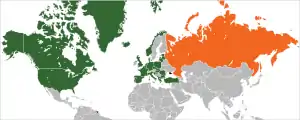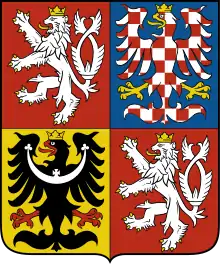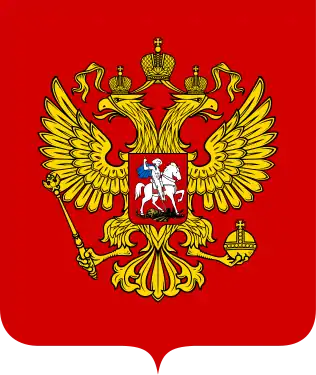Czech Republic–Russia relations
Czech Republic–Russia relations are the bilateral foreign relations between the Czech Republic and the Russian Federation. Unlike Russia, the Czech Republic is a member of Western institutions including the European Union, NATO and the OECD. Relations have substantially deteriorated in recent years due to events such as the Russian annexation of Crimea in 2014 and the poisoning of Sergei Skripal in 2018.
 | |
Czech Republic |
Russia |
|---|---|
Both countries are full members of the Council of Europe and the Organization for Security and Co-operation in Europe. The Czech Republic has an embassy in Moscow, and two consulates general (in Saint Petersburg and Yekaterinburg). The Russian Federation has an embassy in Prague, and two consulate generals (in Brno and Karlovy Vary).
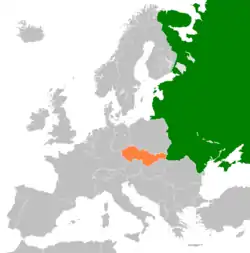 | |
Soviet Union |
Czechoslovakia |
|---|---|
History
During the entire medieval period and early modern period, the Czech lands, in the form of Duchy of Bohemia and Kingdom of Bohemia, were aligned with the Holy Roman Empire and later Austrian Empire. During the first half of the 20th century, Czech-Russian relations were formalized as Czechoslovakia–Soviet Union relations. Czechoslovakia recognized the Soviet Union de jure in 1934. On May 16, 1935 the Czechoslovak–Soviet Treaty of Alliance was signed between the two states as the consequence of Soviet alliance with France (which was Czechoslovakia's main ally).[1]
By the autumn of 1938, relations between Prague and Moscow were not entirely satisfactory. For domestic as well as personal reasons, the Czech President resisted pressing for confirmation of Soviet aid in the event of war. Indeed, no joint military planning had taken place between the two governments.[2]When war appeared to be imminent, however, Edvard Benes recognised the necessity of putting aside the ideological suspicion and hostility of many within his country.
On 20 September, Moscow replied to Benes’s enquiry about Soviet sincerity. The Kremlin repeated its support and rejected the proposal to cede the Sudetenland. Benes, however, conceded to the demands. The Czech President had been warned that if he refused his country would be left to face Hitler alone. On 22 September, the Czech government, led by Milan Hadza, resigned. On the same day at Godesberg, Hitler rejected Chamberlain’s proposals as inadequate.
After the German occupation of Czechoslovakia and the establishment of the pro-German Slovak state in March 1939, The Soviet Union quickly recognized the new status quo and terminated diplomatic relations with Czech representatives. Shortly after the Munich Agreement, many Czechoslovak Communists gained asylum in the Soviet Union, however hundreds of non-communist refugees were sent to the labor camps.[3]
After World War II
After World War II, when Communist Party of Czechoslovakia took over the control of the country through a Soviet-backed 1948 Czechoslovak coup d'état, Czechoslovakia became part of the Eastern Bloc through Warsaw Pact with Soviet Union and eastern and central European socialist countries. On August 21, 1968 following the Prague Spring pro-democracy reforms of the Czech government, the Soviet-led invasion re-established the Communist regime by force. 108 Czechs and Slovaks died and approximately 500 were wounded as a direct result of the invasion. The invasion stopped the Communist Party of Czechoslovakia from making democratic and liberal reforms, and politicians loyal to Moscow gained control again. This damaged relations between the two countries.
1989-present
After the Velvet Revolution of 1989, the independent Czech Republic joined NATO in 1999 and the European Union in 2004, formally re-joined the political Western world after four decades of absence and re-aligned its foreign policy and economic interests with its Western allies.
On December 7, 2011, Russian president Dmitry Medvedev visited Prague, to sign economic contracts and cultural exchange. Both countries consider each other as an important economic partner.
As a response to the Russian military intervention in Ukraine from 2014, the Czech Republic has participated in enacting economic sanctions against Russia. In March 2018, the Czech Republic expelled three Russian diplomats as a reaction to the poisoning of Sergei and Yulia Skripal in the United Kingdom.[4] In March 2018, The Czech Republic arrested and extradited a Russian hacker into the United States on their request.[5] Ongoing tensions in the Russia–European Union relations and NATO–Russia relations since the late 2010s have been described as the Cold War II.
Trade
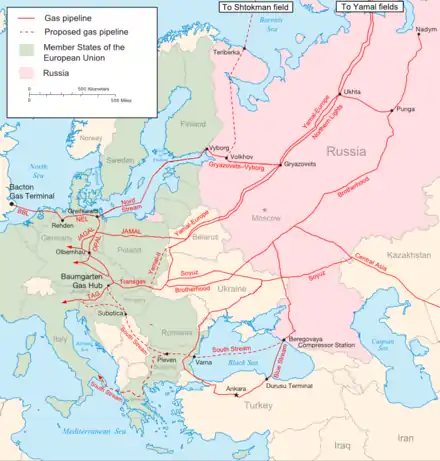
The value of trade between the Czech Republic and Russia is in billions of US dollars. Most imports from Russia into the Czech Republic are raw materials such as fuels and metals; exports from the Czech Republic to Russia are mostly manufactured products.[6]
However, Russia is a marginal trade partner for the Czech Republic, as it is the destination of only 1.7% of Czech exports, as of 2016.[7] The vast majority of exports from the Czech Republic go to other EU members[8] (84.1% in 2016)[7] while most imports into the Czech Republic come from other EU members (76,6% in 2013)[9] or from China (7,3% in 2016).[10]
Public opinion
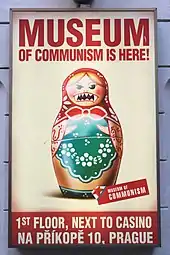
While economic relations were good prior to the 2014 sanctions, and the Czech Republic is a common tourist destination for Russians, the Czech people themselves tend to be distrustful of Russia due to the Soviet invasion of 1968, and tend to have a negative opinion of Russians.[11] Russia remains continuously among the most negatively perceived countries among Czechs in polls conducted since 1991, and 26% of Czechs responded that they have a positive opinion about Russia in November 2016. However the numbers are still improving overall where as in 1993, Russia was only 18% favorable. And the 2016 poll shows that other Eastern European countries like Ukraine were gaining only 22% in positive responses too, putting political aspects into doubt.[12]
Russian propaganda
The Czech intelligence agency Security Information Service (BIS) reports high levels of Russian espionage in the Czech Republic and highlighted "security risks including an increasing influence by organized crime in the state sector" in a 2007 report.[13] The report also states that "intelligence services of the Russian Federation operating on Czech territory organize media campaigns and other activities supporting Russian interests" and that the Czech Republic has been targeted by Russia due to its membership in NATO and the EU reflecting Russia's interests to acquire information about the functioning of these institutions.[13] Russian influence has targeted especially Russian economic interests in the Czech Republic[14] (i.e. the energy sector),[13] but has also infiltrated into politics and media.[15] The Russian intelligence activity focused on pro-Russian propaganda and on political, scientific, technical and economic espionage.[15]
In 2009, two Russian diplomats were expelled from the Czech Republic due to espionage.[16] As of 2015, according to the Security Information Service, the most active foreign espionage in the Czech Republic originated from Russia, followed by China. As of 2017, there were officially 140 Russian diplomats in the Czech Republic, a disproportionately large number compared to other countries, and also compared to only 65 Czech diplomats in Russia.[17]
In December 2018, the BIS revealed that it prevented the activity of dozens of Russian spies during the previous five years, and earlier that year it uncovered and broke up a network of Russian intelligence informants.[18][19]
According to a 2016 study by the Czech Masaryk University in Brno, pro-Russian websites Sputnik and Parlamentní listy are major sources of Russian propaganda in the Czech Republic; the latter of which is described by the report as a particular source of disinformation along with several other publications.[20] Russian information war focuses on spreading misinformation about the EU and NATO, trying to change public perception of Russia and bribing local politicians.[17] Czech officials estimate that the Russian government is behind approximately 40 Czech-language websites presenting radical views, conspiracy theories and inaccurate reports.[21] According to Tomáš Prouza, the "key goal of Russian propaganda in the Czech Republic is to sow doubts into the minds of the people that democracy is the best system to organise a country, to build negative images of the European Union and NATO, and [to] discourage people from participation in the democratic processes".[21]
In 2017, a special unit, the Centre Against Terrorism and Hybrid Threats, was founded under the Ministry of the Interior to counter the threats from Russia among other issues.[21] Czech investigative journalists publish an up-to date list of pro-Russian publications. [22]
Russians in the Czech Republic
Immigration
There is an immigrant minority of 33 970 Russian citizens with a residence permit in the Czech Republic for a period of 12 months or more, as of 2016. It is the fourth largest immigrant group after Slovaks, Ukrainians and Vietnamese, followed by Germans.[23] Russians have the largest proportion of university educated individuals among other immigrant groups.[24] Most incoming Russians are members of the middle or upper classes and their reasons for migration into the Czech Republic are desire for a life in the European Union, better healthcare in the Czech Republic, high levels of corruption in Russia and also political reasons. Russian immigrants have large proportion of business people in comparison with other immigrant groups.[25]
Tourism
The Czech Republic is a popular destination for Russian tourists. In 2017, over 550,000 Russians visited the country.[26]
See also
- Czech and Russian foreign relations
- Foreign relations of the Czech Republic
- Foreign relations of Russia
- List of diplomatic missions of the Czech Republic
- List of diplomatic missions of Russia
- Czech Republic–United States relations
- Russia–United States relations
- Other
- Enlargement of NATO
- Enlargement of the European Union
- Euroscepticism in the Czech Republic
- Russian military deception
- EU–Russia relations
References
- Institute of Marxism–Leninism of the CPCz CC, Institute of Marxism–Leninism of the CPS CC. An Outline of the History of the CPCz. Prague: Orbis Press Agency, 1980. p. 158.
- Robbins, Munich, p.262.
- Dvořák, Jan; Horník, Jan; Hradilek, Adam. "Portréty deportovaných ve světle dokumentů NKVD" (PDF). ÚSTR. Retrieved 18 June 2015.
- Julian Borger, Patrick Wintour, Heather Stewart. Czechs expel three Russian diplomats after UK chemical attack. Reuters. Published on 26 March 2018.
- Czech Republic defies Russia, extradites 'hacker' to United States. Deutsche Welle. 30.03.2018.
- Rusko: Obchodní a ekonomická spolupráce s ČR (Czech). BusinessInfo.cz. 23. 6. 2017.
- Vyvážené zboží míří z 84 procent do EU. Do Ruska jde minimum. ČT24. 13. 9. 2016.
- FIELD LISTING :: EXPORTS - PARTNERS. CIA The World Factbook.
- Podíl dovozu ze zemí EU 28 na celkovém dovozu (%) (Czech). Czech Statistical Office.
- FIELD LISTING :: IMPORTS - PARTNERS. CIA The World Factbook.
- "In Eastern Europe, Pact With Russians Raises Old Specters". The New York Times. 7 April 2010.
- Milan Tuček. Sympatie české veřejnosti k některým zemím – listopad 2016 (in Czech). CVVM. Published on 5 January 2017.
- CZECH INTELLIGENCE: HALF OF RUSSIA’S DIPLOMATS IN THE CZECH REPUBLIC ARE SPIES. Czech Radio.
- Russian Spy Tale Rattles Czechs.
- Russian Intelligence Waging Information War, Says Czech Security Service
- Russia expels 2 Czech diplomats in spy row
- John R. Schindler. Putin’s Central European Spy Base. New York Observer. 05/18/17.
- [Rozbili jsme síť jedné z ruských zpravodajských služeb, reaguje ředitel BIS na Zemanovy „čučkaře“ https://ct24.ceskatelevize.cz/domaci/2673755-rozbili-jsme-sit-jedne-z-ruskych-zpravodajskych-sluzeb-reaguje-reditel-bis-na] (in Czech). ČT24. 8.12.2018.
- Prohlášení ředitele BIS Michala Koudelky k činnosti služby (in Czech). bis.cz. 7.12.2018.
- Analýza „prokremelských“ webů: šíří vlnu zloby a půl procenta soucitu (Czech). Mladá fronta DNES. June 13, 2016
- Robert Tait. Czech Republic to fight 'fake news' with specialist unit. 28 December 2016.
- PROPAGANDA MASKOVANÁ BOJEM ZA SVOBODU A DEMOKRACII (in Czech). Neovlivní.cz. 7.11.2016.
- R07 Cizinci s pobytem nad 12 měsíců podle státního občanství v letech 2008 - 2016 (k 31. 12.)
- Cizinci v ČR: Vietnamci u nás zakořenili. Czech Statistical Office.
- Jan Němec. Rusů v Česku stále přibývá. Jsou už třetí nejpočetnější skupinou imigrantů (in Czech). Hospodářské noviny. 2. 11. 2017
- Rusové se vrací. Počet zahraničních turistů v Česku přesáhl rekordních deset milionů - E15.cz (in Czech). 2018-04-28. E15.cz.

